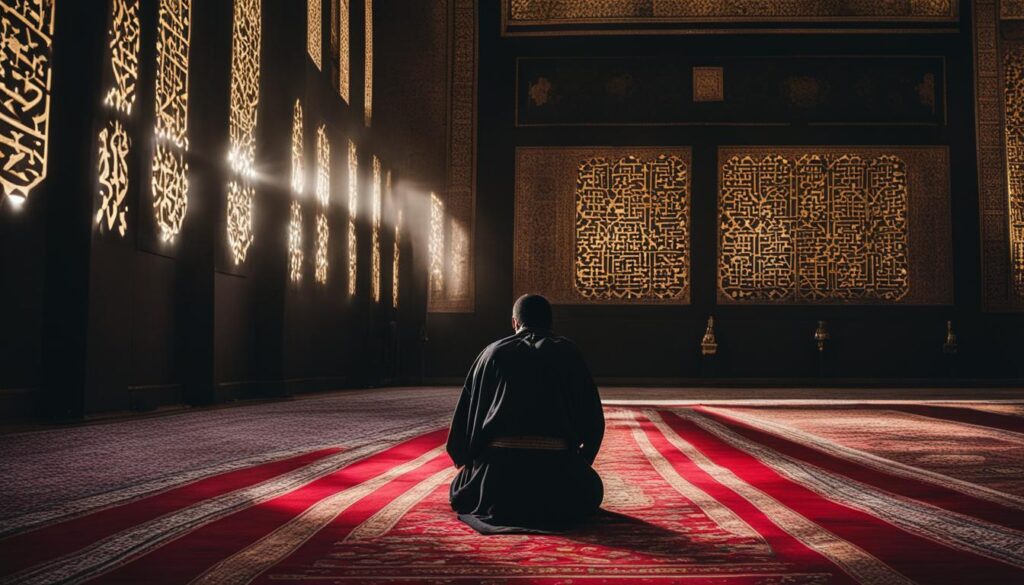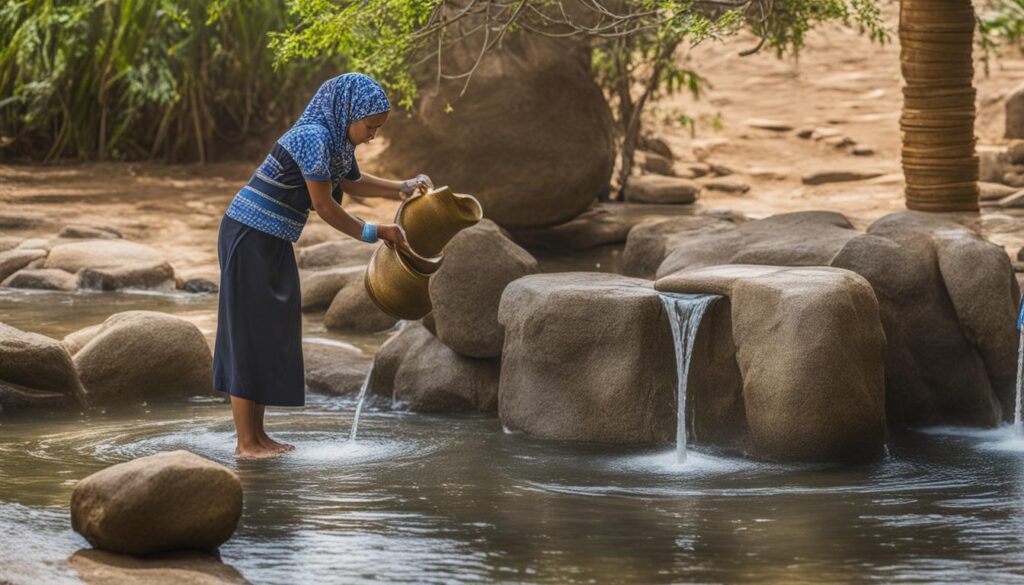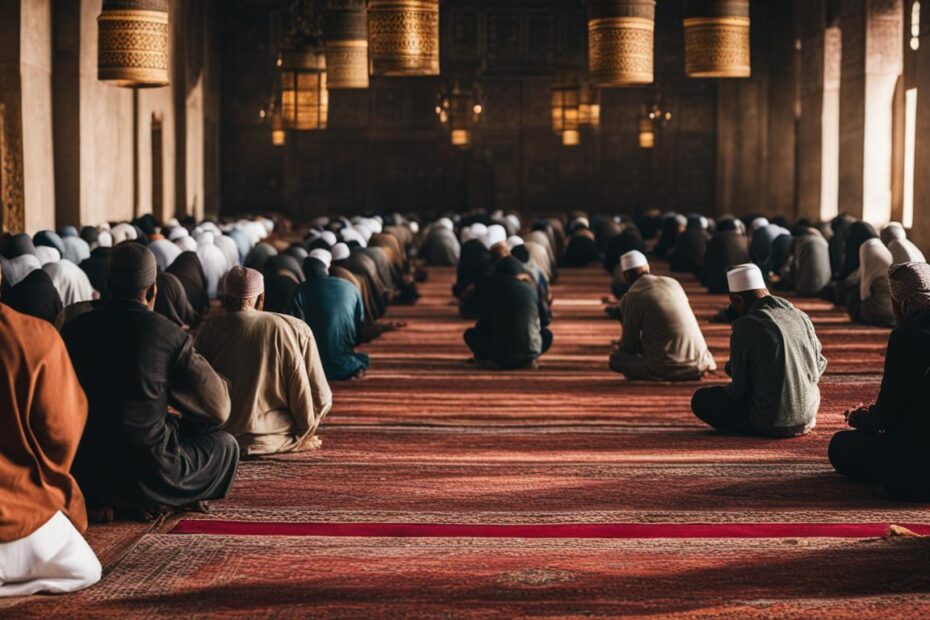Welcome to our comprehensive guide on how to pray in Islam. Whether you are a beginner or simply need a refresher, this article will provide you with the essential steps and guidelines to perform salah, the Islamic prayer. By mastering the basics of prayer, you can deepen your connection with Allah and fulfill your religious obligations.
Key Takeaways:
- Learn the steps of salah, including standing, takbir, recitation, bowing, prostration, and sitting.
- Understand the importance of wudu, the ritual purification before prayer.
- Familiarize yourself with the five daily prayers and their specific requirements.
- Discover the significance of tahaarah, cleanliness, and hygiene in Islam.
- Explore the compulsory (fard) and non-compulsory (sunnah) prayers in Islam.
Learning How to Pray: One Rakah at a Time
Praying salah, the Islamic prayer, is a beautiful act of worship that connects a Muslim with their Creator. To perform one rakah of salah, it is important to follow a step-by-step guide. Here is a tutorial on the basic steps of one rakah:
- Make your intention to pray and raise your hands to your ears, saying Allahu Akbar (God is the greatest).
- Place your hands over your chest, keeping your eyes focused on the ground.
- Recite the opening chapter of the Quran, Surah Fatihah.
- Perform the ruku (bowing), lowering your upper body while keeping your back straight and hands resting on your knees.
- Return to a standing position.
- Perform the sujud (prostration), placing your forehead, nose, palms, and knees on the ground.
- Say a specific phrase in sujud, such as “Subhana Rabbiyal ‘Ala” (Glory be to my Lord, the Most High).
- Rise up from sujud and sit for a moment.
- Perform sujud again, following the same steps as before.
- Return to a standing position.
- Perform the tashahud, sitting and reciting a specific prayer.
- End the prayer by turning your face to the right and saying “As-salamu alaykum wa rahmatullah” (Peace be upon you and the mercy of Allah), then turning to the left and repeating the greeting.
Remember, this is just a simplified guide to one rakah of salah. It is recommended to seek guidance from a knowledgeable person or refer to authentic Islamic sources for a more detailed understanding of the prayer.

The act of salah is a deeply personal and spiritual practice. By learning and perfecting the steps of salah, one can experience a sense of peace and tranquility in their daily lives. Take the time to establish a regular prayer routine, and remember that consistency and sincerity are key to reaping the rewards of this beautiful act of worship.
Understanding the Five Daily Prayers
The five daily prayers in Islam are an integral part of a Muslim’s spiritual journey. Each prayer, known as salah, has its specific requirements and number of rakahs (units of prayer) to be performed. Understanding the differences between these prayers is essential for practicing Islam. Here is an overview of the five daily prayers:
Fajr Prayer (Dawn)
The Fajr prayer is the first prayer of the day and consists of two rakahs. It is performed before sunrise, during the pre-dawn hours. Fajr prayer holds tremendous significance and is highly recommended for all Muslims.
Dhuhr Prayer (Noon)
The Dhuhr prayer is performed after the sun has crossed its zenith, marking midday. It consists of four rakahs and is an obligatory prayer. Muslims are encouraged to perform Dhuhr prayer on time to maintain their connection with Allah throughout the day.
Asr Prayer (Afternoon)
The Asr prayer is performed during the late afternoon, before sunset. It consists of four rakahs and is considered obligatory. Asr prayer serves as a reminder to seek spiritual nourishment in the midst of our worldly responsibilities.
Maghrib Prayer (Sunset)
The Maghrib prayer is offered immediately after the sun has set. It consists of three rakahs and is compulsory. This prayer holds great significance as it marks the transition from day to night and is an opportunity for Muslims to reflect on their actions.
Isha Prayer (Night)
The Isha prayer is performed after the twilight has disappeared, usually a few hours after sunset. It consists of four rakahs and is one of the mandatory prayers. The Isha prayer is the final prayer of the day and allows Muslims to seek forgiveness and mercy from Allah before retiring for the night.
By understanding the requirements and significance of each prayer, Muslims can ensure that they fulfill their religious obligations and cultivate a strong connection with their Creator.
The Importance of Wudu: A Key to Prayer
One of the essential aspects of preparing for prayer in Islam is performing wudu, or ablution. Wudu is not only a physical act of cleansing but also holds great spiritual significance in connecting with Allah. It is necessary to have a valid wudu in order for the prayer to be accepted and to establish a state of purity before standing in front of Allah.
Performing wudu has numerous benefits, both physical and spiritual. Physically, wudu cleanses the body and promotes hygiene, preventing the spread of germs and diseases. From a spiritual perspective, wudu purifies the mind and soul, allowing for a deeper focus and concentration during prayer. Prophet Muhammad (peace be upon him) emphasized the importance of wudu and encouraged Muslims to perform it regularly to experience its spiritual benefits.
“Verily, when a Muslim, or a believer, washes his face (in preparation for prayer), every sin he committed with his eyes is washed away from his face with the last drop of water. When he washes his hands, every sin they committed is washed away with the last drop of water. When he washes his feet, every sin towards which his feet have walked is washed away with the last drop of water. Until he emerges cleansed of sin.”
The Steps of Wudu
Performing wudu involves a specific set of steps to achieve ritual purity. These steps are as follows:
- Make the intention for wudu.
- Wash the hands up to the wrists three times, ensuring that water reaches between the fingers.
- Rinse the mouth three times, swishing water around and spitting it out.
- Cleanse the nose by sniffing water into it and blowing it out three times.
- Wash the face three times, from the hairline to the chin and from ear to ear.
- Wash the right arm up to the elbow three times, followed by the left arm.
- Wipe the head once with wet hands, starting from the forehead to the back and then bringing them back to the front.
- Wash the right foot up to the ankle three times, then repeat for the left foot.
Following these steps meticulously ensures the achievement of ritual purity and prepares the individual for prayer.
| Benefits of Performing Wudu |
|---|
| Physical cleanliness and hygiene |
| Purification of the mind and soul |
| Enhanced focus and concentration during prayer |
| Remission of minor sins |
| Establishment of a state of purity before Allah |
Performing wudu is not only a prerequisite for prayer but also a spiritual practice that brings numerous benefits. By purifying the body and mind, wudu facilitates a deep connection with Allah and provides the necessary foundation for engaging in worship.

The Steps of Wudu: Achieving Ritual Purity
The ritual of wudu, or ablution, is a crucial process in Islam that ensures a state of cleanliness and purity before engaging in prayer. It involves specific steps that must be followed in order to achieve ritual purification. By performing wudu correctly, Muslims are able to cleanse their physical bodies and spiritually prepare themselves for prayer.
To perform wudu, one must begin by making the intention to purify oneself for prayer. This intention should be made sincerely in the heart. The first step is to wash the hands thoroughly, starting from the fingertips and working up to the wrists. Each hand should be washed three times.
Next, the mouth should be rinsed three times, ensuring that water reaches all areas of the mouth. The nose should then be cleaned by sniffing water into the nostrils and blowing it out. This should also be done three times.
The face should be washed three times, starting from the top of the forehead and working down to the chin. It is important to ensure that all parts of the face, including the hairline and beard, are properly washed. The arms up to the elbows should be washed next, starting with the right arm and then the left. Each arm should be washed three times.
After washing the arms, it is necessary to wipe the head. The entire head should be wiped once, using wet hands. Finally, the feet up to the ankles should be washed, starting with the right foot and then the left. Each foot should be washed three times.
By following these specific steps of wudu, Muslims are able to achieve ritual purity and prepare themselves for prayer. Wudu is not only a physical act of cleansing, but it also has symbolic and spiritual significance. It is a reminder of the importance of cleanliness and purity in Islam, both in a physical and spiritual sense. Performing wudu before prayer helps Muslims to focus their minds and hearts on their worship, and to approach Allah with a sense of reverence and purity.

Purification & Cleanliness in Islam: Tahaarah
In Islam, purification and cleanliness play a significant role in the daily lives of Muslims. Tahaarah, or the state of purity, is essential before engaging in acts of worship, including prayer. This emphasis on cleanliness stems from the belief that physical and spiritual cleanliness go hand in hand, and maintaining cleanliness is a way to achieve spiritual well-being.
Islam promotes personal hygiene and cleanliness as acts of worship, reflecting the importance of cleanliness in both the physical and spiritual realms. Regular ablution, known as wudu, is required before offering prayers, as it cleanses the physical body and purifies the mind. By performing wudu, Muslims not only cleanse themselves externally, but they also prepare themselves mentally and spiritually to stand before Allah.
Moreover, cleanliness extends beyond personal hygiene to the environment and the place of prayer. Muslims are encouraged to keep their homes, mosques, and surroundings clean as part of their religious duty. This includes maintaining cleanliness in both private and public spaces, demonstrating respect for oneself, others, and the divine.
Hadith on the Importance of Cleanliness
“Cleanliness is half of faith.” – Prophet Muhammad (peace be upon him)
This saying of the Prophet Muhammad (peace be upon him) emphasizes the significance Islam places on cleanliness. It serves as a reminder to Muslims of the importance of cleanliness in their daily lives, as it is not only a physical act but also a reflection of one’s faith. By striving to maintain cleanliness in all aspects of life, Muslims enhance their connection with Allah and cultivate a sense of inner peace and spiritual purity.

| Cleanliness Practices in Islam | Explanation |
|---|---|
| Wudu | Performing ablution before prayer to cleanse oneself physically and spiritually. |
| Ghusl | A complete bath or shower performed after specific circumstances, such as after sexual intercourse, menstruation, or childbirth. |
| Tayammum | A ritual purification performed in the absence of water, using clean earth or dust. |
| Cleanliness of Clothing | Wearing clean and modest clothing, avoiding garments with impurities or offensive symbols. |
| Cleanliness of the Home | Maintaining a clean and tidy living space, free from dirt and clutter. |
| Cleanliness of the Mosque | Keeping the mosque clean and free from impurities, ensuring it is a place of tranquility and purity. |
The Names and Times of the 5 Daily Prayers
The five daily prayers in Islam are known as Fajr (dawn), Dhuhr (noon), Asr (afternoon), Maghrib (sunset), and Isha (night). Each prayer has its specific time of the day when it should be performed. It is crucial for Muslims to follow the correct prayer timings to fulfill the obligation of prayer and maintain their spiritual connection with Allah.
Here are the specific times for each of the five daily prayers:
- Fajr: This prayer is performed before sunrise, usually starting when the first light of dawn appears. The precise time may vary depending on the location and season. It is recommended to offer Fajr prayer early in the morning to start the day with devotion and seeking Allah’s blessings.
- Dhuhr: The Dhuhr prayer is performed around midday when the sun starts to decline after reaching its peak. It is usually offered after the sun has passed its zenith, and the shadow of an object becomes equal to its actual length plus the length of its shadow at noon.
- Asr: Asr prayer is performed in the afternoon, usually when the sun is still shining brightly but starts to decline. The time for Asr prayer begins after the Dhuhr prayer and continues until the shadow of an object becomes equal to its actual length.
- Maghrib: Maghrib prayer is performed right after sunset, just after the sun has disappeared below the horizon. It is important to offer Maghrib prayer as soon as possible after sunset to fulfill the obligation of performing the prayer on time.
- Isha: Isha prayer is performed in the evening or night, after the twilight has completely disappeared. It is usually performed after a considerable amount of time has passed since sunset to ensure that it is truly night-time.
By adhering to the designated prayer times, Muslims can establish a routine of regular worship and strengthen their relationship with Allah throughout the day.
Table: Prayer Times for Five Daily Prayers
| Prayer | Start Time | End Time |
|---|---|---|
| Fajr | Before sunrise | Just before sunrise |
| Dhuhr | After the sun has passed its zenith | Before Asr |
| Asr | After Dhuhr | Just before sunset |
| Maghrib | Just after sunset | Before Isha |
| Isha | After the twilight has completely disappeared | Before Fajr |
The Compulsory (Fard) & Non-Compulsory Prayers (Sunnah)
In addition to the compulsory (fard) prayers, there are also non-compulsory (sunnah) prayers that are highly recommended to perform. These additional prayers provide an opportunity for Muslims to earn extra blessings and rewards. While the fard prayers are obligatory and must be performed, the sunnah prayers are voluntary and offer a chance to earn additional merit.
The fard prayers are the five daily prayers that every Muslim must perform: Fajr, Dhuhr, Asr, Maghrib, and Isha. These prayers are prescribed at specific times throughout the day and have a fixed number of rakahs (units) that must be completed. The fard prayers are the core of every Muslim’s daily worship and are essential in fulfilling the religious duty.
The sunnah prayers, on the other hand, are additional prayers that were regularly performed by the Prophet Muhammad (peace be upon him) and are highly recommended for Muslims to emulate. These non-obligatory prayers can be performed before or after the fard prayers and provide an opportunity for extra devotion and closeness to Allah.
While the number of units (rakahs) for each sunnah prayer may vary, it is encouraged to perform them regularly. The Prophet Muhammad (peace be upon him) said, “The best of prayers after the prescribed prayers is the night prayer.” This refers to the Tahajjud prayer, which is performed voluntarily after Isha and before Fajr. The Tahajjud prayer is highly regarded and holds immense spiritual benefits.
Conclusion
Prayer holds a significant place in the Islamic faith, serving as a means of connecting with Allah and fulfilling religious obligations. By understanding the basics of Islamic prayer and learning how to pray, Muslims can deepen their spiritual connection and experience the benefits of this sacred act.
Throughout this comprehensive guide, we have explored the essential steps of salah, the importance of wudu and purification, the five daily prayers, and the distinction between compulsory and non-compulsory prayers. Adhering to the proper guidelines and performing prayer with sincerity enables Muslims to enhance their spiritual journey and seek closeness to Allah.
Whether you are new to Islam or seeking to improve your prayer practice, this guide provides the necessary knowledge to perform salah correctly. Remember that prayer is a continuous process of learning and growth. Through dedication, consistency, and a sincere heart, you can establish a profound connection with Allah and experience the immense blessings of prayer in your life.
FAQ
What are the steps of salah?
The steps of salah include standing, takbir, recitation of Surah Fatihah, bowing (ruku), prostration (sujud), sitting (tashahud).
How many rakahs are there in each prayer?
Fajr prayer has two rakahs, Dhuhr prayer has four rakahs, Asr prayer has four rakahs, Maghrib prayer has three rakahs, and Isha prayer has four rakahs.
How do I perform one rakah of salah?
To perform one rakah of salah, make your intention, say Allahu Akbar, recite Surah Fatihah, perform ruku, return to standing, perform sujud, rise up from sujud, sit momentarily, perform sujud again, return to standing, and perform tashahud.
What is wudu and why is it important?
Wudu is the ritual ablution performed before prayer. It is important because it purifies the mind and body, ensuring that one is in a state of purity before standing in front of Allah.
What are the steps of wudu?
The steps of wudu include intention, washing the hands, rinsing the mouth, cleaning the nose, washing the face, washing the arms up to the elbows, wiping the head, and washing the feet up to the ankles.
Why is cleanliness important in Islam?
Cleanliness is important in Islam to maintain physical and spiritual well-being. Proper purification ensures that one is in a state of purity before engaging in worship.
What are the names of the five daily prayers?
The five daily prayers are Fajr (dawn), Dhuhr (noon), Asr (afternoon), Maghrib (sunset), and Isha (night).
What are the compulsory and non-compulsory prayers in Islam?
The compulsory prayers, known as fard, are the five daily prayers. Non-compulsory prayers, known as sunnah, are highly recommended and bring additional blessings and rewards.








